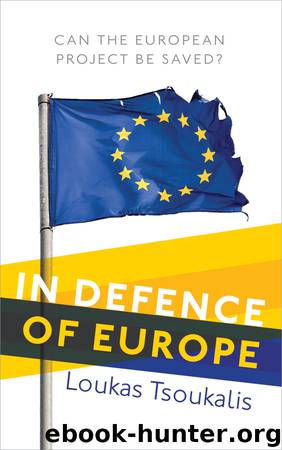In Defence of Europe by Tsoukalis Loukas;

Author:Tsoukalis, Loukas; [Tsoukalis, Loukas]
Language: eng
Format: epub
Publisher: Oxford University Press, Incorporated
Published: 2016-06-02T00:00:00+00:00
Greece’s success story shattered
Critics of German ‘ordo-liberalism’ used to ask jokingly what is worse: a German lawyer or a German economist. And during the crisis, they have come across the true, yet unexpected, answer. Worse than a German lawyer and a German economist is a Greek politician, they now know. The combination of German rules-based economics and Greek clientele politics has been a disastrous combination, although much more for Greeks than for Germans.
Greece represents approximately 2 per cent of the eurozone in economic terms. Yet, the amount of time, effort, and money spent on Greece during the crisis has been out of proportion to this—and with not much success to boast of. However, it is not the first time in its modern history that Greece has attracted much more international attention than its relatively small size would justify, starting with the first major war of independence against the Ottoman Empire back in the early nineteenth century, and continuing with efforts to create a modern European state on Balkan territory, successive stages of territorial expansion and international defaults, heroic resistance to the Axis powers, and a civil war which precipitated the direct involvement of the United States in post-war Europe.15
Greece is a small country with an extremely heavy baggage of history; strategic location; a cosmopolitan elite with a strong presence internationally in the arts, sciences, and finance, not to mention shipping; a disproportionate number of very rich people; large inequalities; and a state that is still more Balkan than modern European. It has a long history of foreign intervention that has largely shaped its own development and has created in turn the conditions for a strong sense of victimhood among Greeks who constantly look for external scapegoats. Nevertheless, modern Greece succeeded in being on the right side of history when it came to strategic decisions and choice of allies, including the two major European wars in the last century. The same applies to Greece’s direct involvement in the European project going all the way back to an early association agreement with the EEC soon after the signing of the Treaty of Rome in the 1950s and full membership since 1981. A clear choice was thus made early on regarding the kind of Europe Greece wanted to belong to. Greece’s European credentials are strong, although with a mixed track record: rich on strategic decisions and often poor on delivery.
Greece’s remarkable transformation during the second half of the previous century from economic underdevelopment and deeply flawed democratic institutions to a fully-fledged democracy and a high standard of living (being classified among the top twenty-five countries in the world by the United Nations before the crisis) was a real success story. And it was a story closely interwoven with its participation in the European project. Membership of the EU provided the anchor of stability, often the benchmark, if not the catalyst, for modernization and development; it also provided some of the funds. This has also been true of other countries that joined after Greece, and it is part of the European success story.
Download
This site does not store any files on its server. We only index and link to content provided by other sites. Please contact the content providers to delete copyright contents if any and email us, we'll remove relevant links or contents immediately.
The Secret History by Donna Tartt(16619)
The Social Justice Warrior Handbook by Lisa De Pasquale(11489)
Thirteen Reasons Why by Jay Asher(7786)
This Is How You Lose Her by Junot Diaz(5768)
Weapons of Math Destruction by Cathy O'Neil(5034)
Zero to One by Peter Thiel(4823)
The Myth of the Strong Leader by Archie Brown(4789)
Promise Me, Dad by Joe Biden(4444)
Stone's Rules by Roger Stone(4415)
Beartown by Fredrik Backman(4414)
How Democracies Die by Steven Levitsky & Daniel Ziblatt(4398)
The Fire Next Time by James Baldwin(4341)
100 Deadly Skills by Clint Emerson(4076)
A Higher Loyalty: Truth, Lies, and Leadership by James Comey(4031)
Rise and Kill First by Ronen Bergman(4012)
The David Icke Guide to the Global Conspiracy (and how to end it) by David Icke(3881)
The Farm by Tom Rob Smith(3871)
Secrecy World by Jake Bernstein(3782)
The Doomsday Machine by Daniel Ellsberg(3730)
